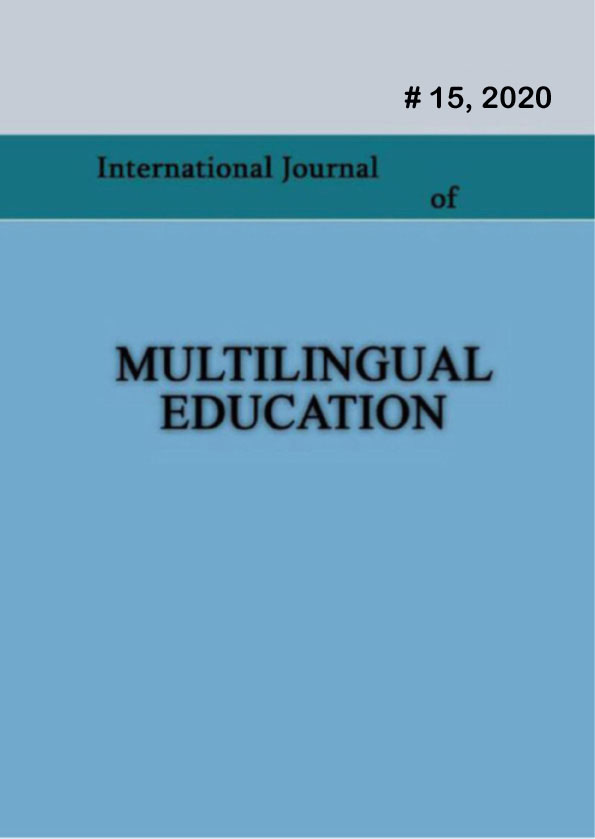Word Stress in Megrelian
Keywords:
word stress, pitch, intensity, MegrelianAbstract
The paper deals with the issues of word stress in Megrelian. In the scientific literature there is no common view regarding the position and nature of stress in Megrelian. Our study is based on experimental analysis. The experiment has revealed that in Megrelian, in two-syllable and three-syllable words the stress is on the initial syllable. However, in some case the stress falls on the penultimate syllable in three-syllable words. As for four-syllable words, the stress is on the antepenult though our experiment did not confirm the presence of the secondary stress. In five-syllable words the primary stress falls on the second syllable and the secondary stress is on the penultima. In six-syllable and seven-syllable words the primary stress is on the second syllable but in six-syllable words the secondary stress is on the antepenult while in seven-syllable words the secondary stress falls on the fourth syllable. The results of our research are also important in terms of teaching Megrelian.
References
Akhvlediani, 1949 – Akhvlediani G. Introduction to general phonetics, Tbilisi State Univesity Publishing, Tbilisi, 1949.
Borise, Zientarski, 2018 – Borise L., Zientarski X. Word stress and phrase accent in Georgian. Proceedings of TAL 6. https://www.isca-speech.org/archive/TAL_2018/
Borise, 2010 – L. Borise L. Disentangling word stress and phrasal prosody: evidence from Georgian, 2019. http://www.nytud.hu/oszt/elmnyelv/elvonal_urali/publ/ Borise2019_MS_ disentangling.pdf
Chikobava, 1942 – Chikobava Arn. On the question of stress in Old Georgian (a preliminary report). II. Bulleten of the Academy of Sciences of the Georgian SU, vol. III, #3, 296– 303, Tbilisi, 1942.
Danelia, 2006 – Danelia K. The Colchian (Megrelian-Laz) Language, Tbilisi, 2006.
Gudava, 1969 – Gudava T. Stress placement in Megrelian. In Giorgi Akhvlediani Festschrift, pp. 106–111, Tbilisi, 1969.
Kartozia, 1996 – Kartozia G. For the genesis of Megrelian conjunction ni (<*ini) “that”, The Structural Issues of the Kartvelian languages, VI, Tbilisi, 1996.
Kartozia et al, 2010 – Kartozia G., Gersamia R., Lomia M., Tskhadaia T. Linguistic Analysis of Megrelian, Tbilisi, 2010.
Kipshidze, 1914 – Kipshidze J. A Grammar of the Megrelian/Iverian Language (together with Chrestomathy and Vocabulary), Saint-Petersburg, 1914.
Kiria, 1991 – Kiria Ch. For the position and distinctive function of word stress in Megrelian, Materials of young scholars conference, Tbilisi, 1991.
Kiria et al, 2015 – Kiria Ch., Ezugbaia L., Memishishi O., Chukhua M., Laz-Megrelian Grammar. I. Morphology, Tbilisi, 2015.
Kluge, 1916 – Kluge T. Beiträge zur Mingrelischen Grammatik. Verlag von W.Kohlhammer, BerlinStuttgart-Leipzig, 1916.
Ladd, 2008 – Ladd D. R. Intonational Phonology (second edition), UK, 2008.
Marr, 1910 – Marr N. J. A grammar of the Chan (Laz) language with texts and a dictionary. The Publishing House of the Imperial Academy of Sciences, 1910.
Rogava, 1956 – Rogava G. Towards the Issues of Accent in Zan, XIII Scientific Session of the Institute of Linguistics, Tbilisi, 1956.
Tsagareli, 1880 – Tsagareli A. A. Phonetics of Megrelian. The Publishing House of the Imperial Academy of Sciences, 1880.
Zhghenti, S. 1953 – Zhghenti S. Main questions of accentuation in Georgian literary language. Ibero-Caucasian Linguistics, 5, 125–163, Tbilisi, 1953.
Downloads
Published
How to Cite
Issue
Section
License
Copyright (c) 2020 Natia Poniava

This work is licensed under a Creative Commons Attribution-NonCommercial 4.0 International License.
Copyright (c) - Authors who publish with this journal agree to the following terms: Authors retain copyright and grant the journal the right of first publication with the work simultaneously licensed under a Creative Commons Attribution-Noncommercial 4.0 International License, which allows others to share the work with an acknowledgement of the work's authorship and initial publication in this journal. Authors are permitted and encouraged to post their work online (e.g., in institutional repositories or on their personal website) prior to and during the submission process, as it can lead to productive exchanges, as well as earlier and greater citation of published work (see The Effect of Open Access). Authors may enter into separate, additional contractual arrangements for the non-exclusive distribution of the journal's published version of the work (e.g., post it to a repository or publish it in a book), with an acknowledgement of its initial publication in this journal.

